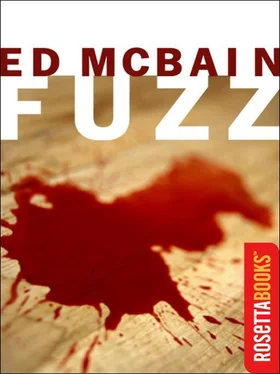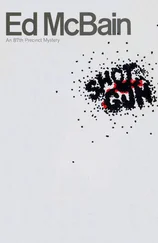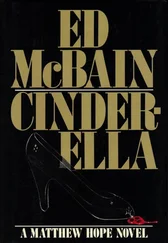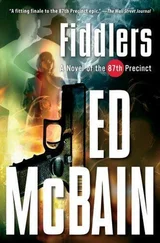Ed Mcbain - Fuzz
Здесь есть возможность читать онлайн «Ed Mcbain - Fuzz» весь текст электронной книги совершенно бесплатно (целиком полную версию без сокращений). В некоторых случаях можно слушать аудио, скачать через торрент в формате fb2 и присутствует краткое содержание. Жанр: Полицейский детектив, на английском языке. Описание произведения, (предисловие) а так же отзывы посетителей доступны на портале библиотеки ЛибКат.
- Название:Fuzz
- Автор:
- Жанр:
- Год:неизвестен
- ISBN:нет данных
- Рейтинг книги:3 / 5. Голосов: 1
-
Избранное:Добавить в избранное
- Отзывы:
-
Ваша оценка:
- 60
- 1
- 2
- 3
- 4
- 5
Fuzz: краткое содержание, описание и аннотация
Предлагаем к чтению аннотацию, описание, краткое содержание или предисловие (зависит от того, что написал сам автор книги «Fuzz»). Если вы не нашли необходимую информацию о книге — напишите в комментариях, мы постараемся отыскать её.
Fuzz — читать онлайн бесплатно полную книгу (весь текст) целиком
Ниже представлен текст книги, разбитый по страницам. Система сохранения места последней прочитанной страницы, позволяет с удобством читать онлайн бесплатно книгу «Fuzz», без необходимости каждый раз заново искать на чём Вы остановились. Поставьте закладку, и сможете в любой момент перейти на страницу, на которой закончили чтение.
Интервал:
Закладка:
He was dead long before his body rolled to a stop on the wide white bottom step.
Chapter 3
Concetta Esposita La Bresca had been taught only to dislike and distrust all Negroes. Her brothers, on the other hand, had been taught to dismember them if possible. They had learned their respective lessons in a sprawling slum ghetto affectionately and sarcastically dubbed Paradiso by its largely Italian population. Concetta, as a growing child in this dubious garden spot, had watched her brothers and other neighborhood boys bash in a good many Negro skulls when she was still just a piccola ragazza. The mayhem did not disturb her. Concetta figured if you were stupid enough to be born a Negro, and were further stupid enough to come wandering into Paradiso, why then you deserved to have your fool black head split wide open every now and then.
Concetta had left Paradiso at the age of nineteen, when the local iceman, a fellow Napolitano named Carmine La Bresca moved his business to Riverhead and asked the youngest of the Esposito girls to marry him. She readily accepted because he was a handsome fellow with deep brown eyes and curly black hair, and because he had a thriving business of which he was the sole owner. She also accepted because she was pregnant at the time.
Her son was born seven months later, and he was now twenty-seven years old, and living alone with Concetta in the second-floor apartment of a two-family house on Johnson Street. Carmine La Bresca had gone back to Pozzuoli, fifteen miles outside of Naples, a month after Anthony was born. The last Concetta heard of him was a rumor that he had been killed during World War II, but, knowing her husband, she suspected he was king of the icemen somewhere in Italy, still fooling around with young girls and getting them pregnant in the icehouse, as was her own cruel misfortune.
Concetta Esposita La Bresca still disliked and distrusted all
Negroes, and she was rather startled — to say the least — to find one on her doorstep at 12:01 A.M. on a starless, moonless night.
“What is it?” she shouted. “Go away.”
“Police officer,” Brown said, and flashed the tin, and it was then that Concetta noticed the other man standing with the Negro, a white man, short, with a narrow face and piercing brown eyes, madonna mia, it looked as if he was giving her the malocchio.
“What do you want, go away,” she said in a rush, and lowered the shade on the glass-paneled rear door of her apartment. The door was at the top of a rickety flight of wooden steps (Willis had almost tripped and broken his neck on the third one from the top) overlooking a back yard in which there was a tar-paper-covered tree. (Doubtless a fig tree, Brown remarked on their way up the steps.) A clothesline stiff with undergarments stretched from the tiny back porch outside the glass-paneled door to a pole set diagonally at the other end of the yard. The wind whistled around the porch and did its best to blow Willis off and down into the grape arbor covering the outside patio below. He knocked on the door again, and shouted, “Police officers, you’d better open up, lady.”
“Sta zitto!” Concetta said, and unlocked the door. “You want to wake the whole neighbor? Ma che vergogna! ”
“Is it all right to come in, lady?” Willis asked.
“Come in, come in,” Concetta said, and stepped back into the small kitchen, allowing Willis and then Brown to pass her.
“So what you want two o’clock in the morning?” Concetta said, and closed the door against the wind. The kitchen was narrow, the stove, sink, and refrigerator lined up against one wall, an enamel-topped table on the opposite wall. A metal cabinet, its door open to reveal an array of breakfast cereals and canned foods, was on the right-angled wall, alongside a radiator. There was a mirror over the sink and a porcelain dog on top of the refrigerator. Hanging on the wall over the radiator was a picture of Jesus Christ. A light bulb with a pull chain and a large glass globe hung in the center of the kitchen. The faucet was dripping. An electric clock over the range hummed a steady counterpoint.
“It’s only midnight,” Brown said. “Not two o’clock.”
There was an edge to his voice that had not been there on the long ride up to Riverhead, and Willis could only attribute it to the presence of Mrs. La Bresca, if indeed that was who the lady was. He wondered for perhaps the hundredth time what radar Brown possessed that enabled him to pinpoint unerringly any bigot within a radius of a thousand yards. The woman was staring at both men with equal animosity, it seemed to Willis, her long black hair pinned into a bun at the back of her head, her brown eyes slitted and defiant. She was wearing a man’s bathrobe over her nightgown, and he saw now that she was barefoot.
“Are you Mrs. La Bresca?” Willis asked.
“I am Concetta La Bresca, who wants to know?” she said.
“Detectives Willis and Brown of the 87th Squad,” Willis said. “Where’s your son?”
“He’s asleep,” Concetta said, and because she was born in Naples and raised in Paradiso, immediately assumed it was necessary to provide him with an alibi. “He was here with me all night,” she said, “you got the wrong man.”
“You want to wake him up, Mrs. La Bresca?” Brown said.
“What for?”
“We’d like to talk to him.”
“What for?”
“Ma’am, we can take him into custody, if that’s what you’d like,” Brown said, “but it might be easier all around if we just asked him a few simple questions right here and now. You want to go fetch him, ma’am?”
“I’m up,” La Bresca’s voice said from the other room.
“You want to come out here, please, Mr. La Bresca?” Willis said.
“Just a second,” La Bresca said.
“He was here all night,” Concetta said, but Brown’s hand drifted nonetheless toward the revolver hosltered at his waist, just in case La Bresca had been out pumping two bullets into the commissioner’s head instead. He was a while coming. When he finally opened the door and walked into the kitchen, he was carrying nothing more lethal in his hand than the sash of his bathrobe, which he knotted about his waist. His hair was tousled, and his eyes were bleary.
“What now?” he asked.
Since this was a field investigation, and since La Bresca couldn’t conceivably be considered “in custody,” neither Willis nor Brown felt it necessary to advise him of his rights. Instead, Willis immediately said, “Where were you tonight at eleven-thirty?”
“Right here,” La Bresca said.
“Doing what?”
“Sleeping.”
“What time’d you go to bed?”
“About ten.”
“You always hit the sack so early?”
“I do when I gotta get up early.”
“You getting up early tomorrow?”
“Six A.M.,” La Bresca said.
“Why?”
“To get to work.”
“We thought you were unemployed.”
“I got a job this afternoon, right after you guys left me.”
“What kind of a job?”
“Construction work. I’m a laborer.”
“Meridian get you the job?”
“That’s right.”
“Who with?”
“Erhard Engineering.”
“In Riverhead?”
“No, Isola.”
“What time’d you get home tonight?” Brown asked.
“I left Meridian, it musta been about one o’clock, I guess. I went up the pool hall on South Leary and shot a few games with the boys. Then I came home here, it musta been about five or six o’clock.”
“What’d you do then?”
“He ate,” Concetta said.
“Then what?”
“I watched a little TV, and got into bed,” La Bresca said.
“Can anybody besides your mother verify that story?”
Читать дальшеИнтервал:
Закладка:
Похожие книги на «Fuzz»
Представляем Вашему вниманию похожие книги на «Fuzz» списком для выбора. Мы отобрали схожую по названию и смыслу литературу в надежде предоставить читателям больше вариантов отыскать новые, интересные, ещё непрочитанные произведения.
Обсуждение, отзывы о книге «Fuzz» и просто собственные мнения читателей. Оставьте ваши комментарии, напишите, что Вы думаете о произведении, его смысле или главных героях. Укажите что конкретно понравилось, а что нет, и почему Вы так считаете.












